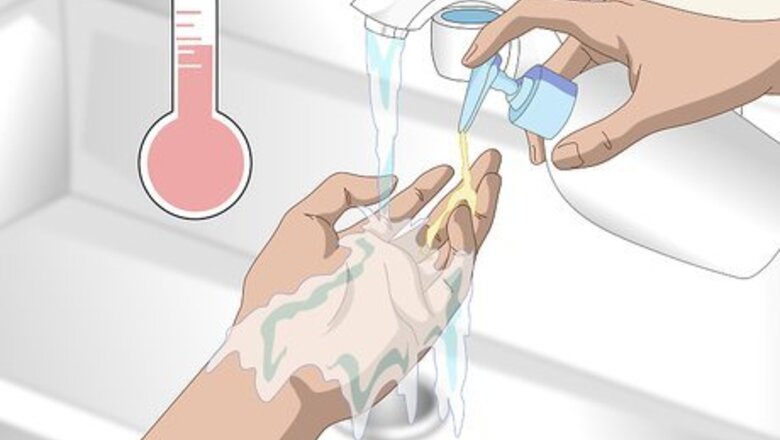
views
Protecting Your Strings
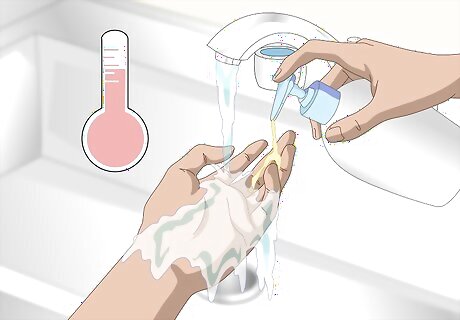
Wash your hands before you play. Use hot water and soap to remove the dirt, skin oil, and other substances that naturally accumulate on your hands. If you consistently play your guitar with clean hands, you’ll reduce corrosion of the strings. Get in the habit of playing with clean hands whenever possible. In a pinch, wipe your hands off with a clean cloth. This removes at least some of the dirtiness from your skin.
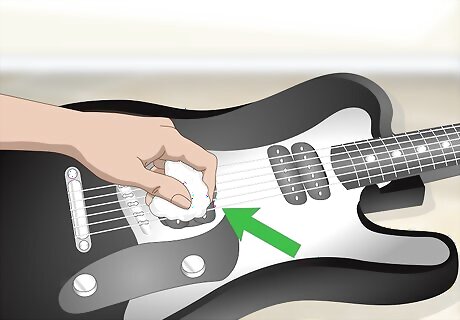
Wipe the strings with a clean, lint-free cloth after you play. Even with clean hands, you’ll leave some residue on the strings each time you play. Grab a clean cloth and gently wipe the strings down. Get in between them and under them as much as possible for the best results. Again, a clean soft cloth is best, but use what’s available to you. Using a paper towel or a clean part of your shirt is better than not wiping them at all.
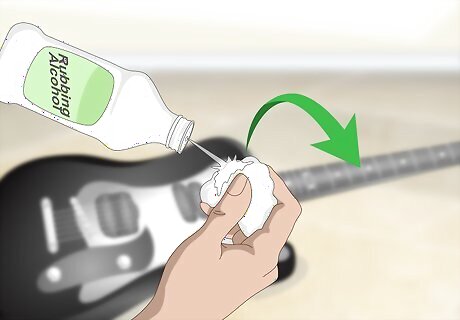
Use rubbing alcohol on a cloth to wipe the strings on occasion. A dry cloth is enough to clean the strings each time you play, but they should be cleaned more thoroughly once a week or so. Use a clean, soft cloth and basic rubbing alcohol to remove the residue that builds up over time. Adjust how frequently you do this based on how often you play. If you play for a few hours every day, it might be good to wipe them with alcohol more often. Be careful not to get rubbing alcohol on the wood of the guitar, as this will dry it out and can ruin it. It helps to slide a dry cloth under the strings as you wipe them down.
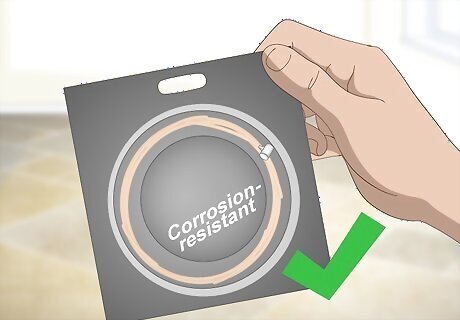
Choose corrosion-resistant strings when you change them out. If your strings are already old, buy new ones that are designed to prevent corrosion. Get strings for your acoustic guitar that are made with a phosphor bronze core. Choose stainless steel strings for an electric guitar. These string types are not guaranteed to never corrode, but they are made to hold up better to the corrosive effects of playing.
Avoiding Corrosion around the Hardware
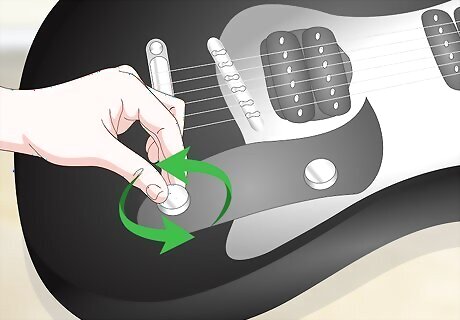
Turn the knobs on an electric guitar regularly. The knobs of your guitar have metal parts, which are prone to corrosion. If they stay in one position, they’re more likely to corrode. Turn them every week or so, especially if it’s a guitar that you don’t play very often. If you play the guitar a lot and adjust the knobs each time, you don’t need to turn them extra times besides when you are playing.
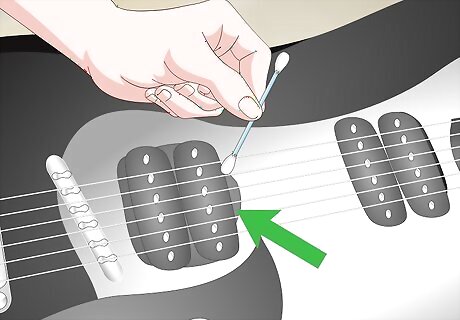
Use a cotton swab to clean around the pickups on an electric guitar. Pickups are magnets embedded in the guitar. The edges where the pickups meet the wood store dust and grime if you don’t clean them. Gently wipe around them with a cotton swab at least once a week to remove buildup. Don’t use any type of cleaning solution because this may cause worse corrosion than doing nothing.
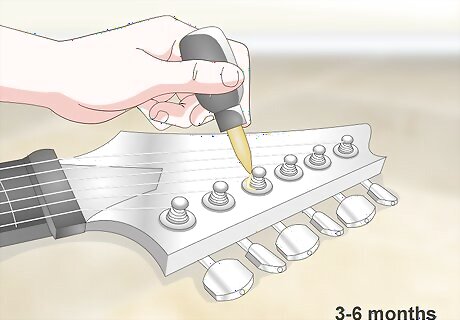
Oil the tuning pegs on occasion. Tuning pegs (or tuning machines) on a guitar are usually made from steel, and they corrode if they aren’t kept lubricated. Look online or at a guitar store for oil that’s specifically for tuning pegs. Don’t use a basic lubricant like WD-40 because it’s too harsh. You only need to oil your tuning pegs every 3-6 months. Get a bottle of peg oil with a small nozzle on the cap which allows the oil to come out in drops. Tip the oil bottle slowly over each tuning peg to dispense a few drops. Turn the knob a half turn in each direction to spread the oil.
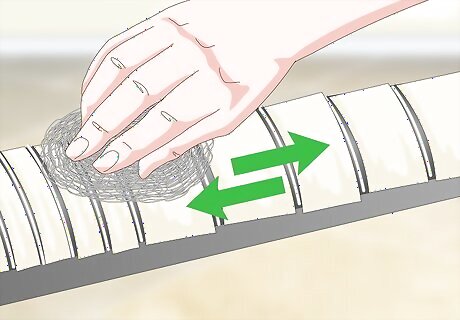
Polish your frets with steel wool. When your strings are removed from the guitar, place a piece of masking tape on either side of all of the frets. Take a piece of steel wool and gently buff each fret along the fingerboard. Use a magnet to pick up the tiny metal particles that are buffed off. Only buff each fret for few seconds. If you buff frets too much, you’ll change the shape of them. Buff frets at most two times a year.
Storing Your Guitar
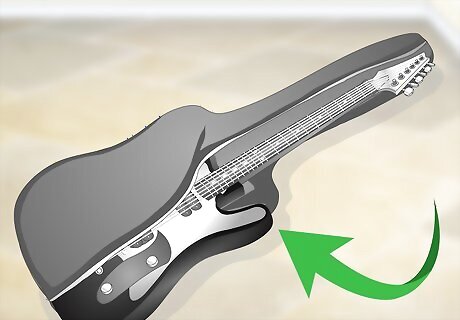
Keep your guitar in its case when you aren’t using it. Avoid leaving your guitar sitting in the open air. Dust and various pollutants in the air will corrode the metal parts faster. Keeping it in the clean, dry case reduces exposure to the elements. Make sure your guitar case does not get wet, or is dried out immediately if does get wet.
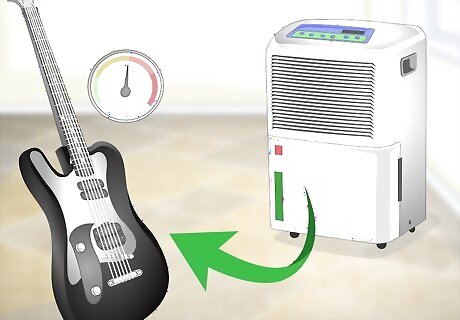
Monitor the humidity where the guitar is stored. Ideally, a guitar should be stored at a relative humidity between 45 and 55 percent. High moisture levels corrode hardware faster. Use a dehumidifier if you know the place your guitar is stored is humid. Get an in-case dehumidifier if you live in a place that is constantly humid. Moisture-absorbent packets are another great way to keep the moisture in your case under control.
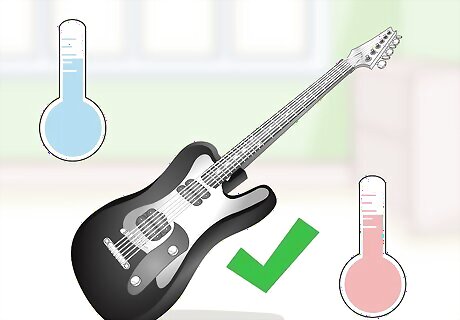
Store your guitar in a climate-controlled room for long-term storage. If you must store your guitar for long periods of time where you won’t be able to maintain it, make sure it’s in a controlled climate. Overly dry or humid storage containers will quickly corrode your guitar. If you have the option to leave your guitar with someone who could perform a bit of routine maintenance on it, this is always a better option than leaving it unmonitored.












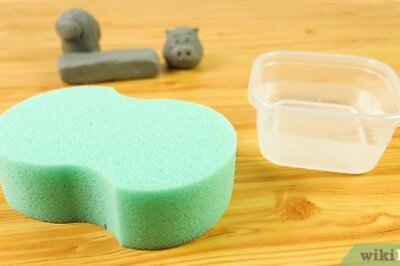




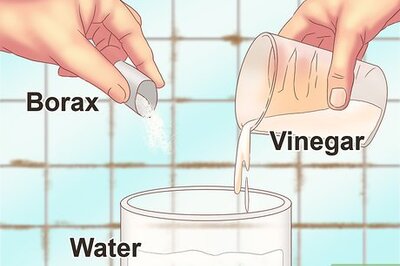

Comments
0 comment